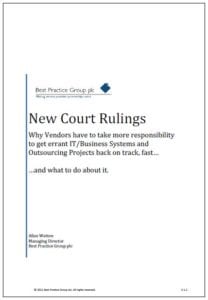A new court ruling will make them think again…
DE BEERS v ATOS ORIGIN [2010]
Have you ever had this happen to you? A vendor commences a major project – perhaps for a large software initiative, service commissioning or outsourcing. Part way through – say 6-12 months and they complain that you keep changing your mind (although you are pretty sure you don’t) about what you wanted; or perhaps they say they had underestimated the scale of the project because you didn’t document your requirements and expectations clearly.
In either event, it comes down to them wanting to charge you more money, or take longer to complete the project – or in some cases, both.
In some situations we have seen, the vendors even go as far to suggest that if you don’t agree to their demands, they’ll have to re-consider their position and potentially pull out of the project.
This happens in more projects than perhaps you’d like to feel comfortable with. Most clients believe that, in the event they don’t capitulate to the vendor’s demands for more resources and money, this will somehow allow the vendor to start reducing its efforts even further to the degree where service levels will drop dramatically – potentially threatening the continuation of the project in any form.
The Judgment
A recent judgment in a case shows how, if you are a client that has relied on a vendor that has represented/demonstrated it has specialist expertise, you can insist on the vendor fulfilling and completing the project at the original cost and time frame – even if the vendor complains he wants more money than agreed at the onset of the project.
If the vendor refuses to complete the project unless you pay them more, they can be held in breach of contract. The consequence of this, subject to what you claim, can be to put you in the position you would have been in had the vendor successfully completed the contract and you were obtaining the benefits you expected out of it.
What can you claim for?
In other words, you can claim for the cost of:
- Having your requirements externally validated and checked by someone independent.
- Contracting with another party for the replacement service, whether it be for software, service commissioning or outsourcing. This includes:
-
- The management and staff time spent in:
- Finding other specialist replacement vendors
- Workshops, discussions and so forth evaluating proposals/solutions from vendors
- Redrafting new contract terms
- External support in the above activities
- The time you and your staff spend in working around the problems caused by your vendors poor service
- Time and costs spent in migrating the service to another vendor
- Time and costs supporting your ‘business-as-usual’ with other temporary vendors in the event your vendor’s poor performance materially and adversely impacts the performance of your business or department.
- All legal and expert fees in the progression of your case.
- The management and staff time spent in:
Considerations about your claim
Note there are two further things to be aware of. Firstly, the cost of the replacement service doesn’t have to be the same or lower than the service you have contracted for. The replacement service could in fact be two or three times more costly and you can claim the full amount from your incumbent vendor.
How can this be the case? Because your vendor may have deliberately ‘low-balled’ the price of the service in the expectation that they could threaten you with increases once you are reliant upon them to provide the service. So the Courts take the view that the price you paid from the incumbent vendor isn’t necessarily what you would pay in normal open market conditions.
The second note is that whilst the cost of the replacement service might well be more than the incumbent service, you can’t claim for what is known as ‘betterment’. This doesn’t mean that where the old service failed and the new service works, that you can’t claim for this. That is expected. No – it’s where you add additional services that didn’t form part of the original contract with your incumbent vendor. In those situations, you can’t claim for the extra bits you’d like from a new service.
![]()
 Free White Paper Download
Free White Paper Download
New Court ruling states your outsourcing and IT projects can be 35% lower in costs while making your vendors more accountable.
- How to cut costs quickly from new and existing major projects and outsourcing agreements.
- How to prevent unexpected costs from arising; if they do, who is responsible.
- How to avoid misunderstandings over your expectations.
- How to improve service delivery performance and forge strong relationships.
- How to ensure your own behaviours don’t undermine the contract (a common problem in doubling the costs and timescales of outsourcing agreements).
- How to achieve your benefits realisation, faster.

